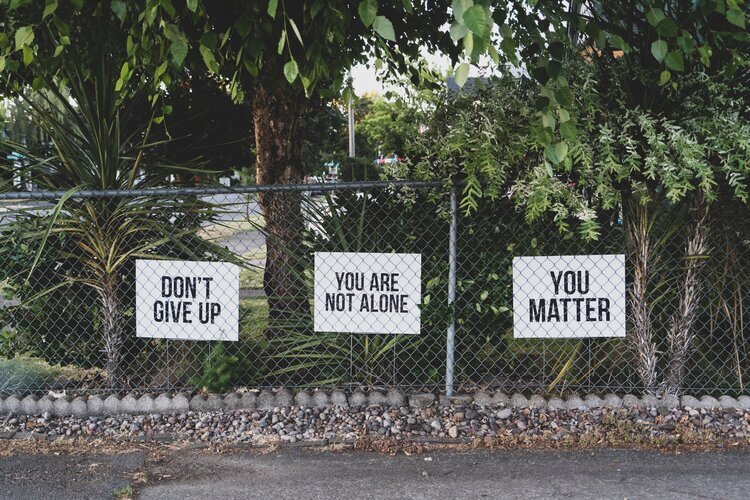This pandemic has reshaped our everyday life, and most Americans have struggled with some degree of uncertainty, fear, or feeling of isolation. Life as we knew it has changed drastically and the mental health of our country seems to be suffering more than ever. But we can embrace this change and look for opportunities to take care of ourselves and our close ones. To provide a head start, below are three tips on focusing on the good and managing the stressors.
Reach out to a friend, family member, or healthcare professional.
When confronted with stress, there are times we must rely on others for support since it may be too difficult dealing with this alone. Those struggling should reach out to family and friends for support. It is also a good idea to reach out to a professional counselor since they are trained to help with these topics. If you are someone who may be handling this new environment and these stressors well, it might be a good idea to proactively offer your support to your friends and family. It is important to recognize when you need to focus on your own mental health, before helping others with theirs. If you are feeling like you are isolating more than normal, you want to make sure you have healthy ways to cope with the increased stress. Look for creative ways to stay social, such as taking a walk with a friend (while practicing social distance, of course) or reaching out to friends through video or phone calls – think of creative ways to stay social while staying safe. Remember, we are all in this together and it is okay to lean on others during these times.
Stay active (run, walk, exercise).
It is a well-known fact that exercise is good for your body. But did you know it is also effective in dealing with mental health? The mental health benefits of exercise are vast and can add an additional way to manage when you are feeling stressed, isolated, or overwhelmed. Exercise is not just about aerobic capacity and looking fit – those who regularly exercise tend to feel more energetic throughout the day, sleep better at night and feel more positive about themselves and those around them.
Not surprisingly, regular exercise has a profoundly positive impact on your mental health, such as depression, anxiety, ADHD, among others. It relieves stress, improves memory, and boosts your overall mood – and many of us need that as we spend most of the time at home. The exciting part of this is that you do not need to be a fitness enthusiast to benefit from it. “Research indicates that modest amounts of exercise can make a significant difference in your mental and physical health. Regardless of your age or fitness level, you can learn to use exercise as a powerful tool to feel better” (Robinson, Segal & Smith, 2019).
A recent study published by the Harvard School of Public Health found that running for 15 minutes or walking for an hour a day reduces the risk of depression by an astounding 26%. And that is not the only benefit – research also shows that exercise is an effective anti-anxiety treatment. It can help relieve tension and stress, help increase energy, and release endorphins which makes you happier.
While there are many benefits to exercise, it is recommended to start slow and ease into the transition. Schedule your workout at the time of day when your energy is highest and start enjoying the positive mental health effects.
Join the Do-It-Yourself “DIY” craze.
There are many benefits of DIY and many levels and ways to execute it. You can do activities like crafting, sewing and home improvement projects. These are natural ways of improving mental health, which are both healthy and fun to engage in. Partaking on a project relieves you from the daily pressures of life. These creative activities are opportunities to shift from daily stressors towards a rewarding hobby or activity.
Taking time out of your busy schedule for a DIY project or activity helps you to turn your attention from negative stressors, towards positive outcomes. Research has shown that seeing the outcome of your projects can be fulfilling, improves your mood and doing this regularly helps you to relax. Further, an additional benefit of DIY activities is that it can help to increase your self-esteem and confidence. Once you complete your small project, you generally feel accomplished and can improve self-worth. I mean, who doesn’t enjoy seeing their finished project?
How Do I Begin?
These suggestions may sound simple on paper (or a computer screen), but the action step is sometimes the most difficult step. Start by using SMART goals (specific, measurable, achievable, relevant, and time-bound) to help get your goals organized. Go slow and be kind to yourself. Beginning new ways of coping takes time and practice before you start seeing a difference. Finally, do what works for you. One way of coping might work wonders for one person but may not work for you. That is okay, just try something else!
REFERENCES
Robinson, L., Segal, J., & Smith, M. (2019). The Mental Health Benefits of Exercise. Retrieved August 20, 2020, from https://www.helpguide.org/articles/healthy-living/the-mental-health-benefits-of-exercise.htm
Short, A. (2019, April 10). The Many Benefits of DIY: Why Crafting and Sewing are Great for Your Mental Health. Retrieved August 20, 2020, from https://thriveglobal.com/stories/the-many-benefits-of-diy-why-crafting-and-sewing-are-great-for-your-mental-health/
Tribune-Star, S. (2020, April 05). Take care of your mental health. Retrieved August 20, 2020, from https://www.tribstar.com/news/local_news/take-care-of-your-mental-health/article_f70eaefb-378c-567f-b242-80fb9aff567f.html
Photo by Dan Meyers on Unsplash

